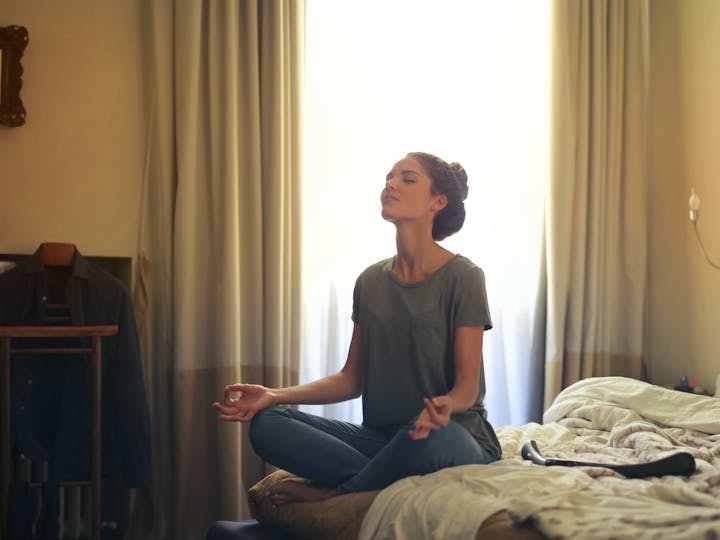Introduction
Life is hectic for many of us with little time for relaxation. However, it is important that we take some time for ourselves to recharge our batteries. Meditation helps us to reconnect with our inner selves, clears our minds, and reduces negativity, enabling us to experience inner peace.
In this post, we will introduce you to five meditation rituals that can help you live more mindfully. They won’t take up too much time in your day and can be easily integrated into your daily routine.
Morning MIndfulness
You should wake up feeling refreshed, but if you’re stressed about the day ahead, get up 10 minutes earlier and spend that time meditating. Calming your mind will help to relax you and eliminate any negative thoughts you might have.
Find somewhere quiet where you can be alone without any distractions. Sit in a comfortable, yet upright, position. Good posture is more positive than slumping in a chair. Close your eyes so you are not visually distracted.
Take a deep breath and inhale for a count of four. Hold your breath for another count of four and then exhale for a count of four. Concentrate on what you are doing to stop your mind from wandering. Repeat this cycle for 10 minutes. While you are doing this, you can say to yourself that you are calm or that you are happy.
While you are meditating, be aware of your senses. This helps you to become connected to your body and not to any negative thoughts you might have going through your mind. Be aware of what textures you are sitting on, what you can hear, what you can smell, and if there is any sort of taste in your mouth.
When the 10 minutes are up, keep your eyes closed for around two minutes and stay seated. This helps you transition from meditation to normal life. Then, open your eyes slowly and take in your surroundings. It is important not to stop meditating abruptly; otherwise, you might negate any good you have done.
Don’t worry if your mind does wander at first, as this is normal. If you do get distracted, consciously bring your mind back to concentrate on your breathing. In time, you will find that you can concentrate on meditating without your mind going elsewhere.
Tea or Coffee Ceremony Meditation – the Midday Break
The best way to relax when you have had a hectic morning is to stop working and have a cup of calming herbal tea or decaffeinated coffee. Turn off all your devices, put on some calming music, and light an incense stick or spray essential oils around the room.
Tea ceremonies are popular in Japan, and you won’t go far wrong following their rituals. They believe that there is beauty in the present and that each moment will never come again. Because of this, you should give yourself to the moment.
The first thing to do is to select your tea. Chamomile is a good choice as it helps with insomnia and reduces stress and anxiety. Lemon balm reduces the stress hormone, cortisol, and relaxes you without making you tired. Green tea, although it contains caffeine, still calms you while keeping your mind alert and reducing anxiety.
When making your tea, attempt to be present in the moment. Breathe deeply and tell yourself that this moment will never happen again. Think about the process a leaf takes to become tea in your pot. Thank the tea for its medicinal properties and for the calming effect it will give you.
Sit down with your tea and take small sips, savoring the flavor of each sip. Take notice of the temperature of the tea and its flavor from when it first goes into your mouth and when it leaves it. Think only of the tea and don’t let your mind wander. End the ceremony by thanking the tea for giving you a calming experience.
Walking Meditation – Afternoon
We generally walk without thinking of what we are doing. However, if you focus on the moment, you will find that you are aware of what you are walking on, the rhythm of your steps, the way your body moves, and what the air feels like against your skin.
Walking meditation can be done anywhere, for example, in a park or forest, in a city, and even at home. You don’t have to walk in any particular way or speed. Do what suits you and enables you to free your mind from any stress you may have suffered that day.
Walking mindfully enhances both body and mind. It helps to improve digestion and balance, regulates blood sugar, and boosts blood flow. This helps you to feel healthier and, therefore, happier. In addition, getting fresh air helps you to sleep better.
When it comes to your mind, walking helps to boost your memory function and improves your focus and mental clarity. Concentrate on your surroundings. This will enable you to stay in the present and will stop your mind from wandering. Anxiety, stress, and depression will start to disappear.
Walking can instill a feeling of gratitude. You are lucky that you can walk and breathe the fresh air, as well as experience the beauty around you. Your problems will melt away the more you walk. As you walk mindfully, you will become aware of the sights and smells around you, giving you an appreciation of the world you live in.
This is a step-by-step guide to mindful walking meditation.
- Choose where you are going to walk. It should be somewhere you are comfortable and there are no distractions.
- Concentrate on your breathing. Feel the air entering your body and leaving it. This can stop you from thinking about your problems.
- Be aware of your senses. Take in your surroundings, what sort of ground you are walking on, the smells around you, and the noises you hear.
- Take care with your posture. Walk upright and don’t slump, but keep your shoulders relaxed. You should look straight ahead. All this helps to increase your awareness of the world around you.
- Harmonize your steps with your breathing. You could, for example, inhale for four steps and then exhale for four steps.
Still meditation and movement meditation complement one another. Still meditation persuades you to look inwards, while movement meditation makes you aware of your surroundings and the beautiful world around you. The former relaxes you while the latter energizes you.
DIY Craft Relaxation – Afternoon
Enjoying crafts is a good way to reduce stress as it allows your mind to focus on the job you are doing. This helps you to live in the present and also fills you with a sense of accomplishment.
Paper crafts can calm you down after a stressful work experience. Try origami, the Japanese art of paper folding. Make an elegant swan or a beautiful flower, and as you make each fold, concentrate on the beauty and precision of the process.
Alternatively, make greeting cards. Use stencils, stamps, or even draw your own pictures. You will be able to concentrate on your artistic skills and focus on the pleasure of giving something that you have made.
If you enjoy sewing, try hand-stitching quilts or embroidery. Both are meditative because of the motion of the needle threading through the fabric.
Painting encourages relaxation while calligraphy mixes art with mindfulness. Creating beautiful writing increases your focus and patience.
If you are a fan of the natural world, why not absorb yourself in creating a mini garden in a glass container? Put pebbles, moss, and little plants inside the container to make a terrarium. Another nature-themed craft is making bookmarks with pressed flowers. Connecting with nature can calm you down and create mindfulness.
Paint old furniture with detailed designs or stand-out colors. Breathing new life into the furniture will breathe life into yourself and calm you down. As a result, both you and your home will be refreshed.
Jewelry is another craft you can enjoy and absorb yourself in, shutting out any stress you might have. Create earrings and pendants by molding polymer clay. Alternatively, get some wire and thread colorful beads onto it. It is rhythmic and calming to thread beads, so you will be fostering mindfulness.
Making candles is another craft that can calm you. Pour wax into jars and add fragrances. You can use these while you are meditating. Melting wax and mixing fragrances is relaxing and will foster mindfulness.
Another relaxing afternoon activity is to make a book nook, a fun craft project where you’ll need to create mini-sized items to place around a miniature scene. These kits have bright colors and a variety of themes for you to choose from. As you have to concentrate, you won’t be thinking about the stresses of the day.
Mindful crafting gives you the opportunity to take a break from the stresses of a busy world. You are able to pause and connect with yourself while discovering new skills. Even if you don’t succeed in crafting, remember that mindfulness is the journey, not the result.
Letting Go – Meditation Before Bed
In the evening, a relaxing hot bath can melt away the stresses of the day. It will help to get rid of any tensions in your body and in your mind.
Fill your bath with water and add Epsom salts, which will help you to sleep and reduce stress. Epsom salts contain magnesium, which is important for the health of your heart and nervous system. Maybe light some candles in the bathroom for soft lighting and play gentle music. Both will help to relax you.
If you only have a shower, opt for a calming and soothing foot soak. Add some mineral salts that will help you to detoxify and soothe tired feet. A comfortable body means a calmer mind. Foot soaks are particularly effective if you have been on your feet all day. Soak your feet for 15 minutes and then gently massage them.
Burn essential oils in your space for relaxation. Lavender will calm you, while citrus and peppermint will energize you. Eucalyptus increases mental clarity and lemon elevates your mood and reduces stress.
Other great oils include frankincense, which is an excellent oil to use as it calms your mind, reduces stress, and supports relaxation. Rosemary boosts your memory and relieves mental stress, while patchouli grounds emotions and promotes a sense of mental balance.
Before going to bed, practice the same routine of breathing as you did in the morning. This will calm you and allow you to have a good night’s sleep.
Conclusion
Meditation helps you to reach a state of calmness and awareness. It involves many techniques, five of which we have told you about. If you don’t have time to do all of them, start with one or two and see what difference it makes to your life.



